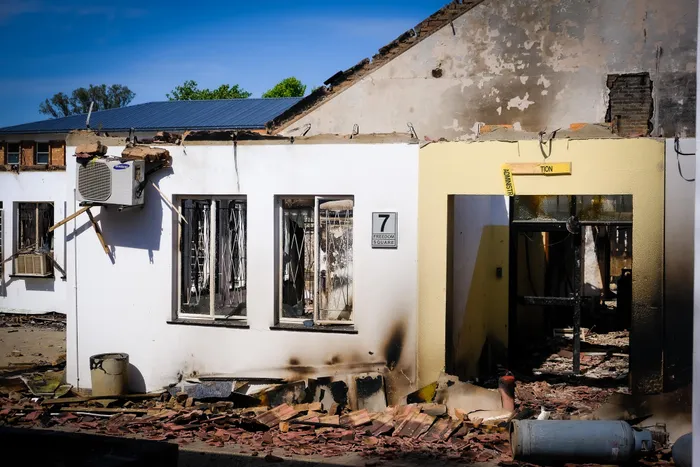
The Administration Building, the Senate Chamber, the Examinations Office and the Human Resources Department were among the buildings devastated by last week's violent protest.
Image: UFH
THE 1976 youth was the first generation to take action in openly expressing discontent with the education system imposed on them.
The situation was worse then because they were fighting against the white-minority apartheid system machinery that imposed Afrikaans as a medium of instruction.
But they never burnt the schools, and believe me, it would have been understood had they done so. That was followed by school boycotts of 1980 and 1984-1985 especially the latter. Still no school was put on fire. What was worse with the latter is that there were those who were saying through slogans “Freedom Now”, “Education Tomorrow”.
Learners went back to school the following year. They did not allow anyone to make them act out of their mandate. Most of these learners (students) were mobilised and not organised. This means that they did not belong to an organisation but were assembled to action. It’s worth emphasising again that both eras were under the apartheid system, but schools were not burnt down.
However, the youth in today’s context are under democracy, and the environment is far better than the previous eras. The best part is that despite the shortcomings or challenges the democracy experiences, the youth can express themselves freely without intimidation.
Amidst the issues at University of Fort Hare, there is even a conspiracy theory, that those who burnt part of the institution are influenced by the people who are opposed to the current principal’s anti-corruption stance.
Some of the people are still under investigation and therefore they want him gone because he is “disturbing their peace and enjoyment of looting”. The best way is to use “children” (students) whose reasons will be understood.
If this conspiracy theory is true, it says a lot about the people behind the destruction. Their selfishness is a clear demonstration that they will do anything and everything for their selfish benefits.
Surely consider themselves as comrades, yet they are shamelessly undermining the history and heritage of the Africans not only of South Africa but Southern Africa.
Giants of Africa, who some became leaders and academics in different respects in their countries were “baked” there. Starting from South Africa to Zimbabwe and beyond, to mention a few, Nelson Mandela, Oliver Tambo, Chris Hani, Robert Sobukwe, Dennis Brutus, Can Themba, Ernest Mancoba, Archibald Campbell Jordan, Robert Mugabe, Herbert Chitepo, Ticofa Samuel Parirenyatwa, Stanley Samkange, Elius Mathu, Charles Njonjo and many more.
The burning did not only affect the history and heritage of our country but academic work that was also destroyed. Whether those students were angry or not, they have counterarguments, other theories, or facts about what they did cannot be justifiable.
On top of that, timing makes this act more suspicious. They are a disgrace and must suffer consequences of their actions. Students are not just future leaders but are supposed and expected to be leaders in one way or the other even now.
If they are involved in such a destructive act, how much more with the ones who did not go to “school”? What about the younger ones who see them as role models? Looking at the damage literally and figuratively the culprits deserve to be punished. Failure to do that will set a bad precedent.
Let us agree that amongst characterisation that suits or fits us a nation, we are a “sick society”.
We, as parents, can hide behind the Constitution as an impediment in disciplining our children, but we still have and will always have a duty. One challenge in our society is too many rights that are not tied or understood in the context of responsibility. Foundation begins at home, and then to church, school, and other relevant institutions.
One of the features of our “sick society” is that we allow the social standing of a person to determine whether a person deserves punishment or not. Or what kind of punishment they must get.
What about the damage and a continuation of damaging and destruction? Must people damage and destroy because their social standing “allows” or will “defend” them? You can burn, damage, and destroy because you are a learner, student, poor or you were angry or drunk? That does not apply to a “normal” person, a taxpayer. Theirs is only to be available to “foot” the bill. Hamba Democracy! All animals are equal, but some are more equal than the others!
Ndabeni is a freelance writer. He holds a Master's degree in South African politics and political economy from Nelson Mandela Metropolitan University.